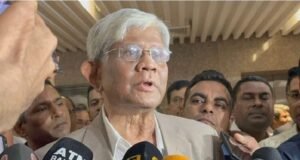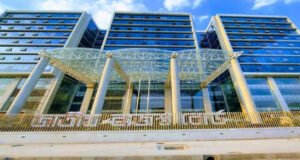 The government of Bangladesh and the Asian Development Bank (ADB) yesterday concluded a 15-day joint review of ADB-assisted projects in Bangladesh to further improve development results,
The government of Bangladesh and the Asian Development Bank (ADB) yesterday concluded a 15-day joint review of ADB-assisted projects in Bangladesh to further improve development results,
Senior government officials, project directors, and ADB staff members from its headquarters and the Bangladesh Resident Mission participated in the review, said a press release. The review programme concluded through a wrap-up meeting which was chaired jointly by Economic Relations Division (ERD) Senior Secretary Mohammad Mejbahuddin and Kazuhiko Higuchi, ADB country director for Bangladesh yesterday.
“The country portfolio review is an important annual exercise to discuss a wide range of issues and agree on actions to enhance performance and achieve development results,” said Kazuhiko Higuchi.
“The review identified and agreed on specific actions to further improve project readiness, reduce project startup delays, expedite procurement and fund disbursements, resolve project-specific issues, improve auditing, and accelerate land acquisition, resettlement and project implementation,” he added.
As of 31 December 2014, ADB’s cumulative lending to Bangladesh stood at $16.1 billion spread across 253 loans, while the technical assistance amounted to $242 million in 439 projects.
ADB portfolio for Bangla-desh currently includes 58 loans amounting to $5.26 billion; and 47 TA and grant projects amounting at $140.2 million.
The multilateral lender, headquartered in Manila, focuses its cooperation to Bangladesh in six sectors- energy; transport; water and other urban/ municipal infrastructure and services; education; finance; and agriculture, natural resources, and rural development. In 2014, ADB approved loans, totaling $968 million, for Bangladesh.
The ADB yesterday awarded four of its best performing project and programme teams in Bangla-desh as part of its efforts to promote efficient project implementation.
ADB Country Director Kazuhiko Higuchi presented the awards for the year 2014 to the winning teams at a ceremony in the capital.
Senior government officials, project directors of ADB-assisted projects, members of the winning project teams, and ADB staff attended the ceremony, said a press release.
The winning project teams are Sustainable Rural Infrastructure Improvement Project, executed by the Local Government Enginee-ring Department; City Region Development Project, also executed by the Local Government Engineering Department; and Third Primary Education Develop-ment Project, executed by the Directorate of Primary Education.
The Second Capital Market Development Programme, executed by the Bank and Financial Institutions Division of the Ministry of Finance, won a special programme award for outstanding efforts in 2014.
“The project/programme teams were selected for efficiency, results delivery, effective project implementation, efforts to empower women, transparency, and other criteria,” said Kazuhiko Higuchi.
The best project team recognition programme was initiated in 2001, and has been a regular annual exercise by ADB to promote development effectiveness of ADB-assisted projects in Bangladesh.
The Sustainable Rural Infrastructure Improvement Project, with the $60 million loan from ADB, is helping to reduce poverty and raise incomes in 21 districts of northwest and southwest Bangladesh by improving climate-resistant road connectivity, and upgrading marketing facilities with specific provision for women.
The project is enhancing rural people’s access to social services, such as health and education, and to economic opportunities.
The City Region Develop-ment Project, with the $120 million loan from ADB, is supporting Bangladesh to overhaul urban planning, infrastructure and services in two big city regions.
The project is improving energy-efficient and environment-friendly urban services, and strengthening management capacity for Dhaka and Khulna city corporations and adjoining secondary towns.
The project’s outcome will include improved urban environment and infrastructure services based on effective regional and urban planning.
Don't Miss
- Rizvi rejects move to make July Charter a core principle of constitution
- Khaleda Zia urges govt to ensure advanced treatment for Farida Parveen
- Country’s 95% primary kids exposed to nicotine
- 4 die ‘inhaling toxic gas’ in Moulvibazar tea garden
- July movement’s impact on classes reflected in SSC exam results: Sylhet board chairman
 Weekly Bangla Mirror | Bangla Mirror, Bangladeshi news in UK, bangla mirror news
Weekly Bangla Mirror | Bangla Mirror, Bangladeshi news in UK, bangla mirror news







